UPDATED: The High Court ruled the U.S. must assure free speech and no death penalty for Julian Assange or the court might have to free the publisher who marked five years in prison today, reports Joe Lauria.
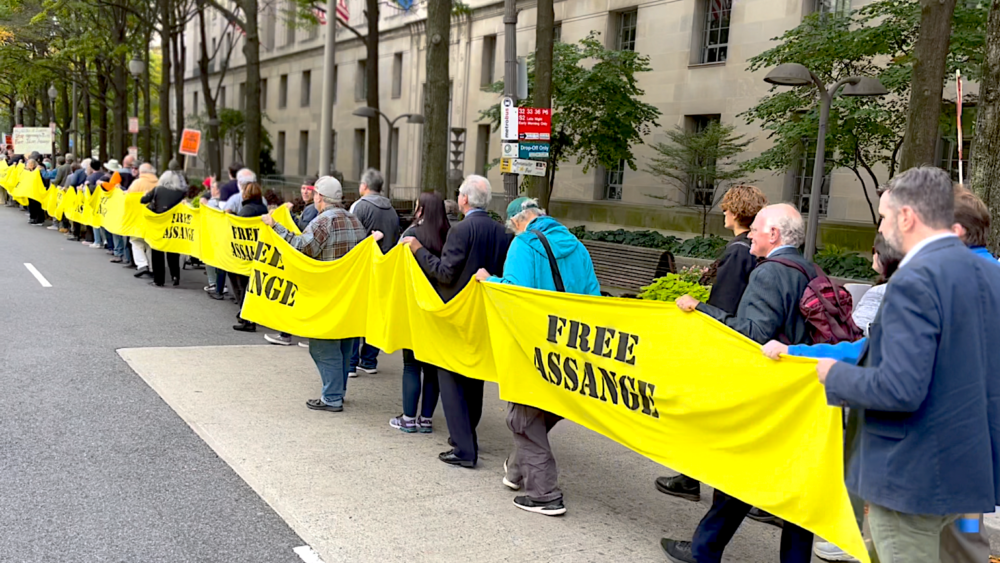
Assange supporters in October 2022 circle the Justice Department Building in Washington. (Joe Lauria)
By Joe Lauria
in London
Special to Consortium News
President Joe Biden’s remark on Wednesday that his administration is considering ending the prosecution of WikiLeaks publisher Julian Assange appears based on a calculation that the U.S. could lose in court on Assange’s appeal against Britain’s order to extradite him.
The High Court of England and Wales in its ruling last month has given the United States until Tuesday to assure Assange will not face the death penalty or the court would have no choice but to follow the law and free Assange.
The two-judge panel also ruled the U.S. must provide a First Amendment guarantee equivalent to Article 10 of the European Convention on Human Rights or it would be “arguable” that Assange’s extradition is “incompatible” with the Convention, which Britain is legally bound to follow.
Because the U.S. appears unable to legally provide the free speech assurance, its prospects of losing an appeal to Assange may have led Biden to say he’s “considering” ending the prosecution.
According to the U.K. Crown Prosecution Service, the violation of the free speech and death penalty provisions would require Assange be set free:
“In all extradition cases, the judge must consider whether extradition would be compatible with the requested person’s human rights. If the judge finds that extradition would not be compatible with the requested person’s human rights, that person’s extradition cannot be ordered, and the judge must discharge them.”
Those human rights are laid out in the European Convention (and in the 1998 British Human Rights Act) and include freedom from capital punishment and freedom of speech.
On the death penalty, the High Court said bluntly in its ruling that if extradition “would be contrary to Convention rights under the Human Rights Act 1998” article 3 [against ‘torture, … inhuman or degrading treatment’ or punishment], “then extradition must be refused.”
That language is unequivocal: The U.S. must guarantee there will be no death penalty or Assange will walk out of Belmarsh Prison, where he’s been held since April 11, 2019, exactly five years today.
On the right to freedom of speech, the judges said if Assange “is not permitted to rely on the First Amendment, then it is arguable that his extradition would be incompatible with article 10 of the Convention.” In that case, the court could arguably be bound to also order Assange be freed.
Despite the CPS saying if denied his human rights, including freedom of expression, “the judge must discharge” Assange, the High Court limited its language to him only having an “arguable” case on speech.
The problem is the U.S. can’t legally guarantee Assange’s First Amendment rights. And after four years it still hasn’t offered an assurance it would not seek the death penalty.
Without both assurances by next Tuesday, the High Court said Assange will be granted a full appeal, which the United States could lose if the court follows the law on freedom of speech.
Thus Assange’s extradition is more in doubt than ever before, especially after a reporter asked Biden Wednesday: “Do you have a response to Australia’s request that you end Julian Assange’s prosecution?”
And he responded: “We are considering it.”
Given the U.S. faces a deadline it cannot meet, and after what Biden has said, will the U.S. end Assange’s prosecution by Tuesday?
Why the U.S. Can’t Guarantee the First Amendment
In USAID v. Alliance for Open Society, the U.S. Supreme Court ruled in 2020 that non-U.S. citizens outside the U.S. don’t possess constitutional rights. Both former C.I.A. Director Mike Pompeo and Gordon Kromberg, Assange’s U.S. prosecutor, have said Assange does not have First Amendment protection.
Marjorie Cohn, law professor and former president of the National Lawyers’ Guild, told Consortium News‘ webcast CN Live! last month, that because of the separation of powers in the United States, the executive branch’s Justice Department can’t guarantee to the British courts what the U.S. judicial branch decides about the rights of a non-U.S. citizen in court.
“Let’s assume that … the Biden administration, does give assurances that he would be able to raise the First Amendment and that the [High] Court found that those were significant assurances,” Cohn said. “That really doesn’t mean anything, because one of the things that the British courts don’t understand is the U.S. doctrine of separation of powers.”
“The prosecutors can give all the assurances they want, but the judiciary, another [one] .. of these three branches of government in the U.S., doesn’t have to abide by the executive branch claim or assurance,” Cohn said.
Assange contends that if he’s given First Amendment rights, “the prosecution will be stopped,” Cohn said. “The First Amendment is therefore of central importance to his defense. And so that’s why they are giving Assange another shot at possibly raising this issue on appeal.”
She added that the U.S.-U.K. Extradition Act “bars extradition if an individual might be prejudiced due to his nationality and due to the centrality of the First Amendment to his defense. If he’s not permitted to rely on the First Amendment because of his status as a foreign national, he’ll thereby be prejudiced, potentially very greatly prejudiced by reason of his nationality.”
‘If he has the right to free expression and freedom of speech, then what he did, what he’s accused of doing, would not violate the law,” Cohn said.
So if the U.S. cannot provide the First Amendment assurance its case violates Article 10 of the European Convention and according to the CPS, “extradition cannot be ordered, and the judge must discharge” Assange.
The High Court would only go so far as to say Assange had an “arguable case,” however. But it is a case that the United States could arguably lose.
Why Hasn’t the U.S. Assured No Execution Yet?
On the second day of Assange’s Feb. 20-21 High Court hearing came a startling admission from Ben Watson KC, representing the Home Office. He said in open court that the home secretary signed Assange’s extradition order on June 17, 2022 without ever asking the U.S. for an assurance against the death penalty, a normally routine undertaking in extradition cases in Britain involving states that still have capital punishment.
Watson went further, however. Cohn said he “admitted the facts alleged against Assange could sustain a charge of aiding or abetting treason or espionage, and that if he’s extradited, there’s nothing to prevent a charge of aiding or abetting treason or a charge of espionage from being added to the indictment.”
Craig Murray, former British diplomat, told CN Live!:
“I think that it’s actually very surprising that no assurance has been given on the death penalty, because that’s absolutely routine. It happens in loads of extraditions. It’s normal. It’s a template taking 2 minutes to do it. They’re very used to doing that and there’s no reason not to. They actually don’t want to execute Julian. They want to keep him entombed for life in an incarcerated kind of slow death which is a warning to other journalists as opposed to providing a martyr through execution.”
Then why didn’t the Home Office ask for one? And why hasn’t the U.S. offered the “routine” assurance after four years? Were the DOJ and the Home Office hoping they could keep the option of the death penalty open? Why has this only become an issue after four years? It makes little sense.
The startling admission that the U.S. had given Britain no assurance that it wouldn’t seek the death penalty — and that the Home Office hasn’t even asked for one even though the U.S.-U.K. Extradition Treaty bars extradition without it — led some commentators to believe the U.S. and Britain did it on purpose to get out of this mess.
“It was a rather extraordinary thing for the U.S. .. to say, well, if the Trump administration comes into office, they may seek the death penalty based on new charges,” said U.S. constitutional attorney Bruce Afran on CN Live!
“I read it as the Biden administration trying to get a denial of extradition to get off the hook, so to speak. Australia is pushing heavily for Julian to be sent back home. Australia is a critical U.S. defense ally,” Afran said.
He added:
“I’m reading it that that concession was made to set up the basis for a denial by the court in the U.K. because clearly if the death penalty is available, there can be no extradition. And it looks to me that the decision was very predictable once that concession was made. So I see it as the U.S. is trying to kind of get out of a difficult position by making the very concession that would block extradition.”
Murray, however, believes the U.S. will give the capital punishment assurance on Monday or Tuesday. “You absolutely cannot extradite without assurance on the death penalty,” he said. “So they have to get on and they will get it by the deadline. They’ll get right up to the deadline, but they will give it on deadline.”
The controversy over the death penalty led one columnist for The Boston Globe to actually complain that a reason the U.S. should not have the death penalty is because it is preventing the extradition of Assange. “No matter what you may think about Assange — that he’s a hero of radical transparency or a treasonous leaker of government secrets — the failure of the US government to promise that he will not face the death penalty is a needless roadblock to resolving his case,” wrote the columnist, adding that capital punishment presented “an obstacle to the government’s interest in bringing Assange here to face trial.”
‘Appear to Be the Same’
So U.S. prosecutors cannot guarantee Assange’s First Amendment rights to satisfy Article 10 of the ECHR because of the U.S. Supreme Court ruling and so far, inexplicably, the U.S. has failed to guarantee he won’t get the death penalty.
On capital punishment the High Court is unequivocal, while on the free speech issue, it is hedging, though both are found in the European Convention and the U.K. Human Rights Act.
“They appear to be the same issue, as both arise under the human rights provision, obviously, though the contours of the free expression issue are more nuanced, and give rise to greater scope for extradition,” said Afran. “Clearly, whether or not the death penalty is available, is a blunt and stark issue, whereas the scope of free speech is always more blurred. But I think the legal standard is the same.”
He said that because the U.S. conceded in court the death penalty is still possible and has still not provided an assurance it is “unlikely the British court could ever extradite under U.K. law. For this reason, a plea agreement would be a fair, and face saving resolution for all sides.”
Cohn added:
“There is a possibility that instead of filing assurances, the Biden administration will opt to avoid the political pitfalls of Assange being extradited to the U.S. before the election and actually offer a plea bargain with credit for time served to end the case.”
A Plea Deal
Biden confirmed the U.S. is considering a way to end the prosecution amid the weaknesses of the U.S. case and the rising political costs. Assange now appears to be holding some valuable cards.
The possibility of freeing Assange on a reduced charge of mishandling official information was raised by Afran last summer in a CN Live! webcast.
Assange pleading to a misdemeanor instead of being prosecuted under the Espionage Act appears to have been discussed between U.S. prosecutors and Assange’s lawyers according to a much-scrutinized March 20 article in The Wall Street Journal.
Last August, Afran told Consortium News’ CN Live! webcast:
Bruce Afran, a U.S. constitutional attorney, told @consortiumnews that it would be possible for #Assange to remain in Britain to work out a plea deal.
“Usually American courts don’t act unless a defendant is inside that district and shows up to the court,” Afran said. “However,… pic.twitter.com/8l9N3fmCjs
— Consortium News (@Consortiumnews) August 14, 2023
The WSJ reported:
“The U.S. Justice Department is considering whether to allow Julian Assange to plead guilty to a reduced charge of mishandling classified information. … If prosecutors allow Assange to plead to a U.S. charge of mishandling classified documents—something his lawyers have floated as a possibility—it would be a misdemeanor offense.”
Afran told Consortium News that because Assange was not a U.S. government employee, if he wanted a deal along these lines, he would have to plead guilty to having conspired to mishandle official information with Chelsea Manning, who at the time of her leak was a serving member of the U.S. military. In August Afran called this the “worst case scenario,” in other words the worst thing he could have done, and a guilty plea can not create a precedence for future journalists, Afran said.
(Federal statute §1924 would not apply to Assange because it only targets government employees or officers mishandling official material, Afran said.)
“The conspiracy statute is 15 U.S.C. 371,” he said. “That carries a fine or imprisonment of less than five years. So the government could let him off with a fine, or give him credit for time served [exactly five years] in the U.K. while awaiting extradition.”
Afran added: “Similarly, he could serve one day in Australia, and still satisfy the statute.” The Australian government would have to consent, however, and since it has called for the case to end, it should.
Assange can plea to the misdemeanor without fear of criminalizing the reporter-source relationship as a “conspiracy” because a guilty pleas is not precedential, said Afran.
Only a Remote Plea
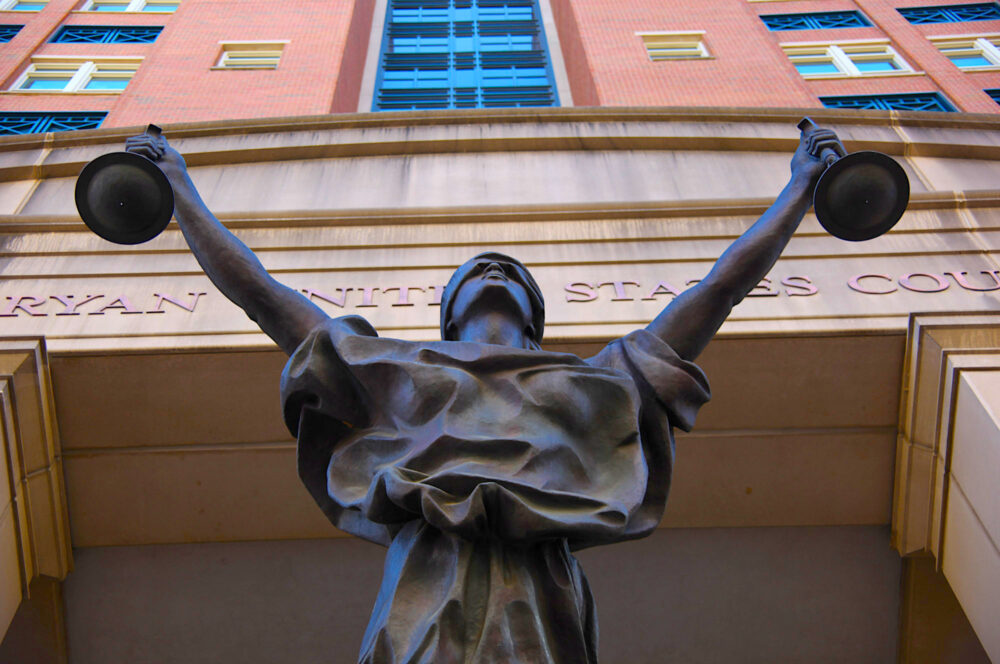
Albert V. Bryan United States Courthouse in Alexandria, Virginia, the United States District Court for the Eastern District of Virginia, where Assange would be tried if extradited. (Tim Evanson/Wikimedia Commons)
A likely sticking point to a deal would be if the U.S. insisted that Assange go to the U.S. to enter into the plea. That could well scuttle any negotiated deal, no matter how favorable to Assange.
Gabriel Shipton, Assange’s brother, told the Sydney Morning Herald last year that Assange going to the U.S. to complete a deal was a “non-starter.” He said: “Julian cannot go to the US under any circumstances.”
According to Afran,
“Usually American courts don’t act unless a defendant is inside that district and shows up to the court. However, there’s nothing strictly prohibiting it either. And in a given instance, a plea could be taken internationally. I don’t think there’s anything wrong with that. It’s not barred by any laws. If all parties consent to it, then the court has jurisdiction.”
The U.S. could insist on Assange voluntarily going to the U.S. for two reasons, according to Afran:
1). it would remove the chance of a European Court of Human Rights injunction stopping his extradition should the High Court in London reject his last appeal; and
2). it would give the U.S. an opportunity to “change its mind” once Assange was in its clutches inside the Virginia federal courthouse.
“The U.S. sometimes finds ways to get around these agreements,” said Afran, who is representing CN in its case against the U.S. government and NewsGuard. “The better approach would be that he pleads while in the U.K.”
Interestingly, the WSJ, without attribution, said a remote plea is possible. The Journal story said:
“Under such a deal, Assange potentially could enter that plea remotely, without setting foot in the U.S. The time he has spent behind bars in London would count toward any U.S. sentence, and he would likely be free to leave prison shortly after any deal was concluded.”
A Non-Denial Denial
A statement issued in reaction to the WSJ story by Assange’s U.S. lawyer, Barry Pollack, was interpreted by some commenters on social media as a denial that any negotiation has taken place. Pollack said:
“It is inappropriate for Mr. Assange’s lawyers to comment while his case is before the UK High Court other than to say we have been given no indication that the Department of Justice intends to resolve the case and the United States is continuing with as much determination as ever to seek his extradition on all 18 charges, exposing him to 175 years in prison.”
It may sound like a denial but this carefully-worded, lawyerly statement does not actually deny that talks have taken place or are ongoing. It instead implies the Assange side is dissatisfied with the government’s positions to resolve the case.
Consortium News had received off-the-record confirmation from two sources that negotiations took place from at least last December. The WSJ story was further confirmation of this. Biden’s remark Wednesday confirms that a deal is actively being considered.
Why the US Would Want a Deal Now
The U.S. first floated the possibility of a plea deal with Assange last August, when Caroline Kennedy, the U.S. ambassador to Australia, told The Sydney Morning Herald: “I think that there absolutely could be a resolution.”
The newspaper reported: “Pressed on whether US authorities could strike a deal with Assange to reduce the charges against him in exchange for a guilty plea she said: ‘That’s up to the Justice Department.’”
Gabriel Shipton told the Herald at the time: “Caroline Kennedy wouldn’t be saying these things if they didn’t want a way out. The Americans want this off their plate.”
Clearly, the last thing Biden needs in the middle of his re-election campaign is for a journalist to show up in chains to American shores to stand trial for publishing truthful information revealing U.S. state crimes.
Donald Trump, who is responsible for having Assange arrested, imprisoned and fighting extradition, would nonetheless hypocritically blame Biden for Assange’s extradition, knowing that parts of his base want Assange free.
"We're considering it," Biden said in response to a question about Australia's request that he end the prosecution of WikiLeaks publisher Julian Assange. per WH pool.
— Kellie Meyer (@KellieMeyerNews) April 10, 2024
The international pressure on Biden has grown significantly in the past year, damaging the U.S.’s image and reputation. Several Latin American presidents have lobbied him to free Assange. The Australian parliament passed a resolution calling on him to do so. Parliamentary groups in numerous U.S.-allied nations have asked Biden to let him go.
International human rights and press freedom groups have called for his release and the Democratic-leaning New York Times joined four other major newspapers in calling for the prosecution to be ended.
Add to this the international and domestic outcry over Gaza, and the Democrats are desperately trying to relieve some of the enormous pressure on their 81-year old candidate, who is freaking out over it.
To make a deal with Assange, Biden would have to stand up to the Democratic Party, of which he is the nominal head, presumably still upset over the DNC leaks that some Democratic voters still use to blame Assange for Trump; and to the C.I.A., likely still angry over the Vault 7 release, the largest leak of C.I.A. materials in history.
Throwing Assange as a bone to his critics on the party’s left would at least reduce some pressure.
If the Department of Justice leaked the plea story to the WSJ, it would have been to put pressure on Assange to accept a deal on U.S. terms, setting Assange up to take the blame if a deal falls through. This tactic might further explain Pollack’s pointed response.
The Outlook
So, the parameters of a deal that might be acceptable to Assange could look like this: no admission of violating the Espionage Act; acceptance of some sort of lesser charge ; and Assange entering the plea from Britain without arriving on U.S. soil, where the prosecutors could “change their minds.”
If the U.S. misses Tuesday’s deadline for the assurance, a formal High Court appeal becomes automatic to begin months from now. That would still give the U.S. time to complete a deal before the appeal begins.
It might come down to whether the U.S. assesses it could lose the appeal since it can’t guarantee Assange’s free speech rights, even if it files the assurance on the death penalty. The High Court could in that scenario accept Assange’s “arguable” case and interpret the law to mean his extradition would violate his rights and he must be freed.
Little has been normal in the highly-politicized Assange case, however. The High Court wouldn’t allow evidence that the foreign intelligence service of the nation seeking his extradition plotted to kidnap or kill him or that it spied on his privileged conversations with his lawyers. It would not agree that his alleged crime is a political offense that would bar his extradition.
So at this late stage the court cannot be relied on to follow the law and do the right thing. Despite the growing political pressure, Assange’s fate is still very much in the hands of people who want to silence him.
CORRECTION: An earlier version of this story incorrectly said that Assange pleading guilty to the misdemeanor of conspiracy to mishandle official information could create a precedent for future journalists by criminalizing the reporter-source relationship as a “conspiracy.” In fact, a guilty plea cannot create a binding precedent for future cases.
Joe Lauria is editor-in-chief of Consortium News and a former U.N. correspondent for The Wall Street Journal, Boston Globe, and other newspapers, including The Montreal Gazette, the London Daily Mail and The Star of Johannesburg. He was an investigative reporter for the Sunday Times of London, a financial reporter for Bloomberg News and began his professional work as a 19-year old stringer for The New York Times. He is the author of two books, A Political Odyssey, with Sen. Mike Gravel, foreword by Daniel Ellsberg; and How I Lost By Hillary Clinton, foreword by Julian Assange. He can be reached at joelauria@consortiumnews.com and followed on Twitter @unjoe


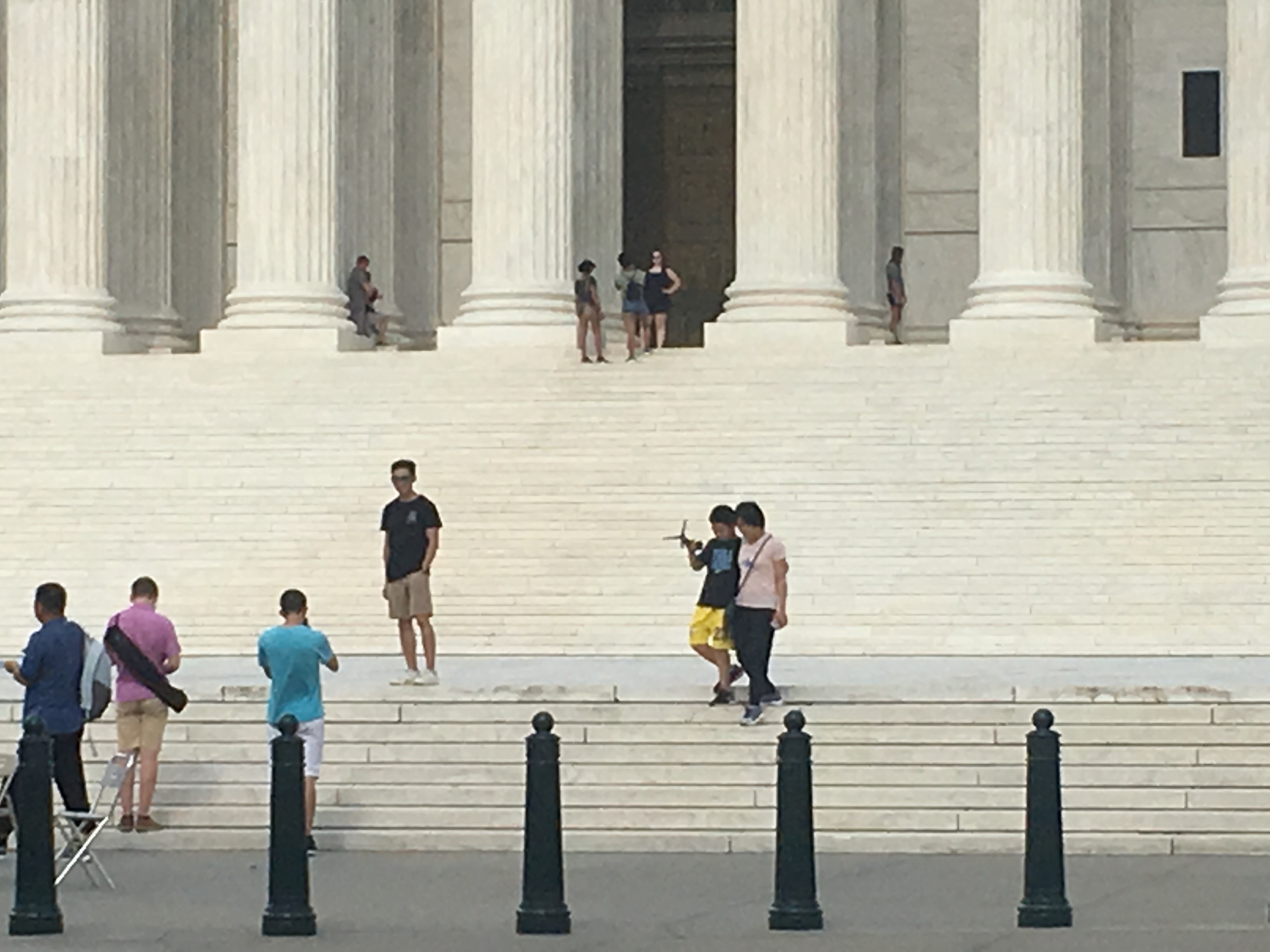
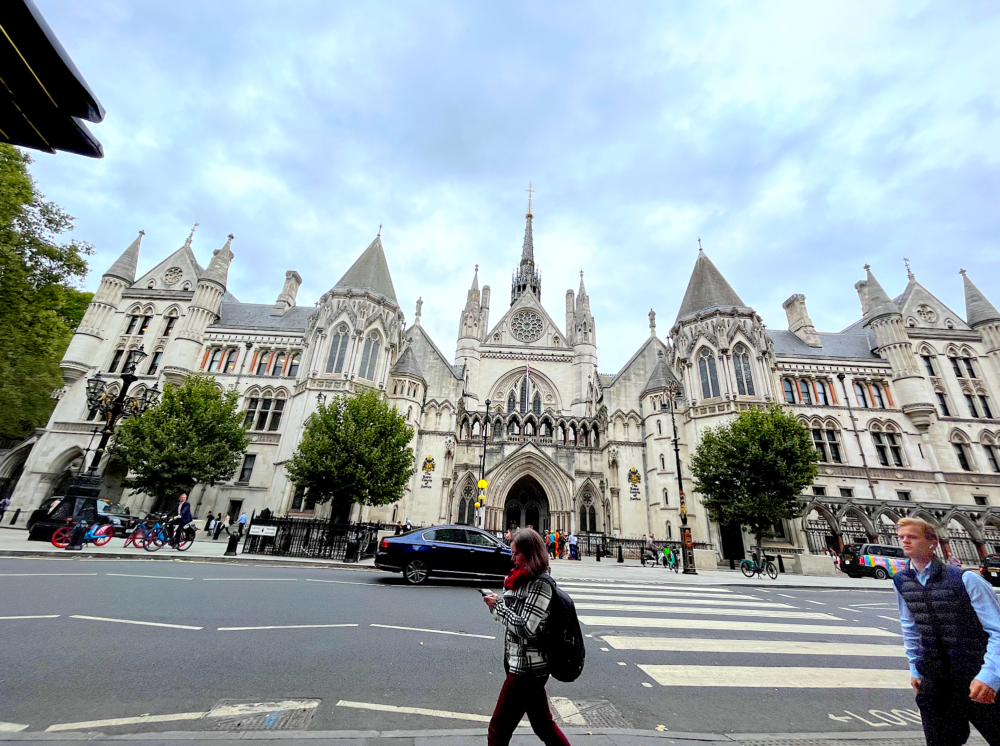
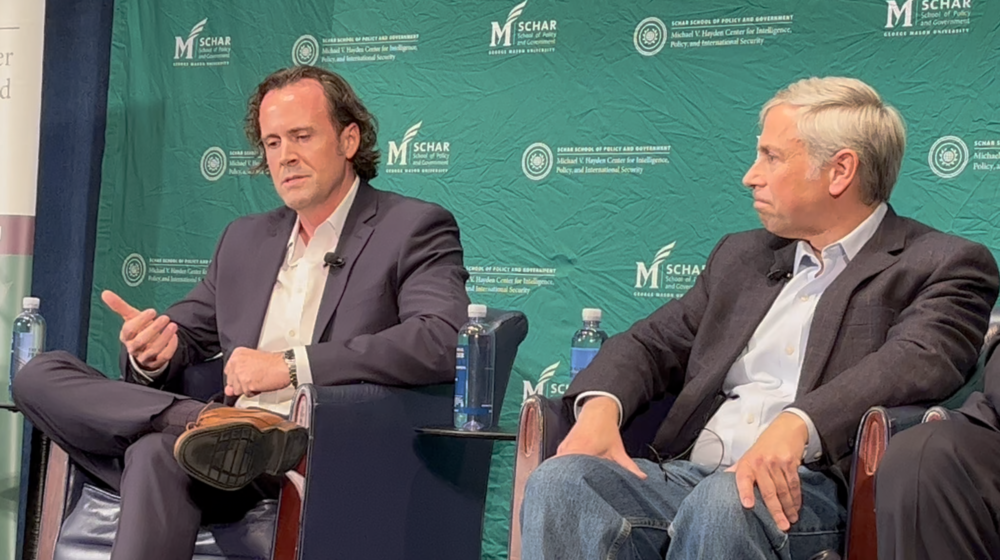
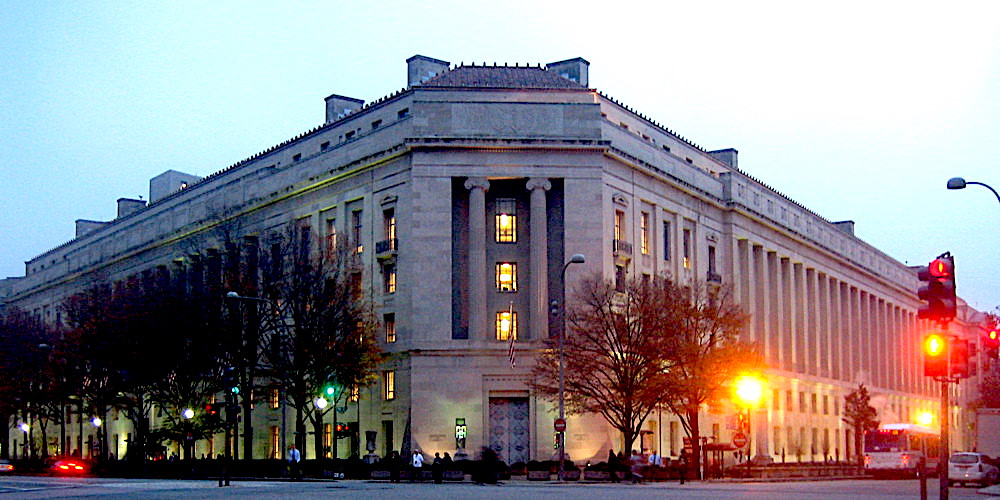
I would like to try to pick apart the official spin on Julian’s actions which have exposed government criminality. The basic view, as recently expressed by I think Blinken, is that classified information can NEVER be exposed because doing so endangers national security and individuals involved in defending the nation. This, then, is a basis for a purported illegitimate “mishandling” in Julian’s case. And this argument disallows saying he did nothing wrong and was instead a heroic truth-teller. In short, fooling with classified information is automatically a crime, case closed. I argue not so.
This view is deeply flawed. In the essential concept of classified and secret, information has to be what protects the nation in terms of its BASIC PRINICIPLES in governing it, and its relations with its people. In this case these principles are found in the constitution and the idealism that has been celebrated since the nation’s beginnings in the 18th century. That tradition has not only included “go not in search of monsters to destroy,” or respond militarily as defense not aggression, but has implied also–as essential to democracy–that the nation not fall into the hands of a special interest group, such as the military industrial complex (MIC) to lead it toward actions adverse to the country’s well-being in order to benefit a few rogue operators (and more specifically return the country in the direction of upper class and feudalism).
If that MIC then adds in to its operations propaganda rationales to cover its actions as “patriotic” and “heroic” and “serving the people” instead of being an instrument for what we have come to call the “deep state,” a special interest group that does not represent the majority, and is not democratic, then it is operating outside fundamental understandings for what is in the interests of national security. In fact, it is the OPPOSITE of this. It is nefarious and subverting, or in the nature of a coup against basic concepts in the nation’s security.
This is what has happened, and what Julian has exposed. To say his action has endangered national security and broken laws is ludicrous and Orwellian reversal by the real criminal perpetrators, even though they have assumed high government positions, as with Blinken. My interpretation here is thus both very simple and obvious while at the same time very difficult to contemplate–that this is how far governance has drifted into corruption.
The governing class no longer knows right from wrong as in Gaza, nor how to investigate and rectify the criminal behavior exposed by Julian Assange. Instead in its embarrassment it not only tries to shut him up, imprison him, and lie and obfuscate the case with absurdities such as “mishandling,” it will go so far as to develop plans to murder him. This is how bad it is, and officials in both the US and UK know it while pretending to be on the side of right and justice.
This is the ongoing fight in my view as we approach April 16 and the next step–the so-called “assurances” for basic rights in what once was the understanding of what this country stood for. These assurances must be exposed and denied as being as phoney as the rest of it.
Another closely argued analysis by Mr. Lauria and well done, but the thought lingered in the back of my mind throughout reading it, and then Mr. Lauria clarified all in the last two paragraphs.
The British courts have not shown any inclinations in this matter regarding justice, fairness, honesty, or truthfulness, and I do not expect the High Court to be anything other than the servant of the vengeful US hegemon.
“The U.S. sometimes finds ways to get around these agreements,” … Nearly fell out of my seat when my eyeballs absorbed that little ditty.
Since the MAGA machine will try to crucify Ol’ Joe no matter what he does with Assange, then WHY NOT do the right thing?
Jury member # 0.000000001
Re: Editorial boards above correction assertion: In this lay readers opinion, and especially in this day and age of regime lawlessness, a guilty plea is precisely the ground for setting a future precedent!
What the legal facts are today may just as well be illegal tomorrow, according to the ‘sliding rules’ of the international rules of law.
Are we not now, in the very process of learning what the real truth?
Gotta disagree with this:
“The problem is the U.S. can’t legally guarantee Assange’s First Amendment rights.”
The AG or DoJ could issue a written legal opinion that the First Amendment applies to Assange as a journalist and publisher – or some kind of consent decree with Assange’s lawyers, and filed with the Court of jurisdiction. That would limit the prosecution of the case. But they would never do that for political and policy reasons, not legal reasons.
Thank you to Consortium News and Joe Lauria for staying on this case, when so many other crises are eating up readers’ attention.
It is truly a shameful reality that the whole world knows that the word of the U. S. government cannot be trusted.
UNITED STATES official corporate assurances are absolutely worthless. All you have to do is listen to United States Politicians and their buddies and they say with their own words that they want Julian Assange dead and disposed and one of the places they use for their corporate murders is the Federal Bureau of Prisons. With BOPPER staff that views Federal Judges as useful idiots, which that point can not be argued successfully that they are not useful idiots to the congressional prison complex, they fill those private prisons up with political prisoners everyday. Prisoners in a FBOP can literally get any weapon from the Federal Bureau of Prisons staff to kill whoever you want inside a BOP private prison facility, the prison staff control the evidence so there is never an independent investigation of anything. In the event the UK politicians, London Court sends Julian Assange to the United States for his alleged speech violations, once in the custody of the corporate United States and turned over to the custody of the entity called United States Department of Justice, he will never get a fair trial in U.S. congressional sponsored federal courts where the outcomes of all cases are rigged before the case is even filed and that is against Americans, who somehow have rights or the illusion of rights in the congressional corporation courts, how would foreigner Julian Assange get a court trial that is not rigged by the corrupt federal judges who are each bought and paid for lackeys of an interlocking system of crime that relies on US politicians like Chuck Grassley to hide behind the fraud, murder, case rigging testimony while they each point the finger at the other in name only branches of the corporation, that is the circle jerk of Chuck Grassley and all its affiliates, cohorts of Good Ole Boy. In the corporation United States there in fact exists an corporate executive, corporate legislative, corporate judicial and corporate media that are each 100% hopelessly corrupt from bottom to top, inside and out the largest gang of cons to ever occupy a nation by force, fraud and murder, financial corruption, money laundering of the revenues extorted off of the American people who have no choice and no say in any of the four pretend branches of corporate United States. Of course you could wish it was different, but it’s not. Julian Assange’s family would never get Julian’s Human Remains after U.S. Politicians and their lackeys get custody of his body. The UK politicians and London Court actors have already helped reduce the health and life of Julian Assange by holding him prisoner without bail for their cohorts in Washington DC, granting extradition of Julian Assange to the criminal U.S. politicians that occupy the North American continent is the death sentence. Let’s pretend for a minute that Julian Assange is extradited to the criminals in Washington DC, once Julian Assange’s body is in the custody of the criminals in the entity styled as U.S. Department of Justice, BOP, he would never leave the BOP even if a congressional corporation federal clown judge granted the case dismissed, or the clerk of court dismissed the case, the BOP would still not release the body until the sentence is served. United States politicians, officials don’t really care where the murder takes place, they just want it to. If you just look at this case, the U.S. criminals that committed the war crimes want to murder the publisher that reported the U.S. criminals war crimes. No sane man or woman would grant extradition to the worlds largest collection of dishonorable corporate U.S. criminal employees who are known to commit murder everywhere they go, spreading their deadly democracy everywhere they militarily occupy. Additionally U.S. politicians and their corporate federal employees do not care that you know they are criminals, war criminals, all they care about is getting revenge against the reporter who performed the trade of journalism that offends the U.S. criminal officials ego, who somehow thinks Washington DC is the center of the universe, it was once a superpower, but that all was lost once they allowed the merger of private corporations and State under the hybrid fascist business model of profits at all costs, then they moved on to the closure of the courts of law, sold the factories to their business partner China and took their fraudulent corporation business model and occupied North America with the military under the guise of pretend civil government, but government not really. The truth is there is no civil government, North America is a militarily occupied regime by force and fraud.
5 years of torture and jail for someone who committed zero crime and is not even a UK or US citizen.
The former west is dead and this parody of ‘justice’ shows how deep all our institutions are rotten from the media to the court and the puppet politicians installed in power by their billionaire pimps.
What a goat rodeo.
The primary driver of the US case is to deny the First Amendment. And officials have already been caught out planning to murder Assange apart from any pretensions of due process. How can any assurances from the US be trusted?
Thank You Joe
How is Assange’s health? He may not be well enough to plea to anything in any case. Torture can disable persons.
Beware. As the red Indians always said “white man speaks with forked tongue” So one will never know which way the wind is going to blow. Having said that my thoughts go out to Julian and hope he will be freed as soon as possible.
Are ethnic Russians not white too? Do they “speak with a forked tongue”?
I cannot believe that America has become a lying, power driven society where neither People nor a Free Press can survive. Sadly, that appears to be our current status. Is this nation over in less than 300 years? It does seem that way as so many in Congress are idiots, or perhaps they have no reason to do anything except turn their own nation into a society of serfs. We have become a nation with a thin veneer of sad and useless humans attempting to rule the world..
Julian Assange did a service to the world in his truth telling ——so Joe Biden after throwing away war money on murdering so many in Palestine —–what exactly is your purpose? We know that Trump already has brain death with his insanity —–and Joe , looks like you’re going that way too. NO! Neither you Biden nor Israel
have no right to destroy the only planet we have.
FREE JULIAN ASSANGE—— Perhaps it is you Biden and Netanyahu who need to be locked up. The planet will certainly continue without either of you.
“I cannot believe that America has become a lying, power driven society ….”
Oh dear, perhaps you are one of the few left who “cannot believe it” …. Ironically, there are plenty of the right who do …
He’s not going to plead guilty to “having conspired to mishandle classified data with Chelsea Manning.” The act of whistle-blowing is obviously “mishandling” in the eyes of the authorities.
Such a deal would make any act of revealing information in cooperation with the whistle-blower somehow “wrong” or irresponsible. This is obvious obfuscation by “the law” or the party that is being exposed.
So the plea deal angle seems to come down to “some sort of lesser charge.” What might that be? I don’t see errors in what Julian did.
This then comes down to the political advantages vs. disadvantages of letting Julian “off.”
Favored by some in Trump’s base? But not favored by a great many others in Trump’s base? The case seems tied to how well Trump is going to do in getting elected in the next few months. Meanwhile, Biden must sweat and delay.
President Biden should also consider the number of votes he could lose in the upcoming presidential election if he does not drop the
charge and Assange is extradited from the UK to the US!
FREE JULIAN ASSANGE!!
Considerations of cost drive these decisions.
That is why President Nixon was persuaded by Attorney General John Mitchell that it would not be a good idea to prosecute Chairman of the Joint Chiefs of Staff Admiral Thomas Moorer for spying on his administration (the Moorer-Radford Affair).
Further reading:
“Silent Coup: The Removal of a President” by Len Colodny and Robert Gettlin
For God’s sake Free Julian Assange..!
Which god are you beseeching?
Is it the god of Judaism, the god of Christ or the god of Mohammad?
They’re not available for consultation right now as they’re occupied with more important internecine family issues!
“The U.S. must guarantee there will be no death penalty or Assange will walk out of Belmarsh Prison, where he’s been held since April 11, 2019, exactly five years today.”
And then what would prevent his immediate arrest on slightly modified charges designed to satisfy the no-execution obstacle and perhaps 1st Amendment obstacle? They changed indictments at least once already DURING the appeal, so obviously a re-arrest would be even easier. I hope there are several bodyguards for Assange waiting the second he steps outside of the jail, to thwart an arrest or serving of a new indictment or whatever.
Also–keep travel plans out of the UK closely guarded, or intentionally wait until the last moment to decide. The US is fine with forcing diplomatic planes down. And obviously with their allies bombing or raiding embassies. Never let up your guard until on home soil (or wherever the destination would be). Better to be paranoid than dead or in jail again.
US “guarantees” are not worth the paper they are written on – for one thing, as pointed out, that decision to avoid a death penalty is up to the Courts, not the Justice Dept. and the Courts in DC have shown themselves to be quite
hard-assed …
The US simply cannot be trusted in anything these days. Its default position on everything is always dishonest and duplicitous.
It always plans to deceive.
Always.